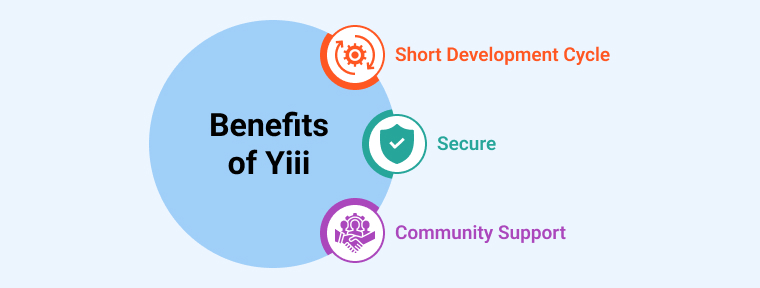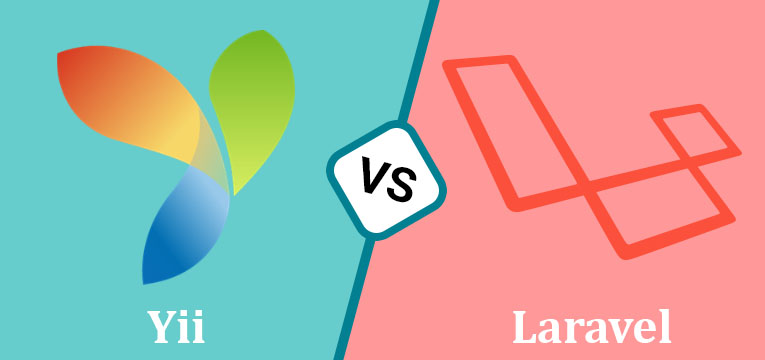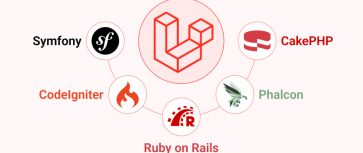Yii vs Laravel- Which is More Suitable for Web Development?
How does a website function? Have you ever thought of it or were curious about knowing it? What’s going on behind the scenes “the user interface” you interact with. Well, in the tech space, the more you know, the better it works! Speaking further about the backend development, you will come across a wide range of frameworks such as CodeIgniter, Phalcon, Zend, Symfony, CakePHP, Laravel and Yii. The following post will help you evolve in regards to your perception of PHP development space, either to choose yii or laravel for web apps- a detailed comparison.
1. Why Consider PHP Frameworks for Web Development?
With the growing trend of digitalization! It has become extremely crucial to catch the eye of your potential users. For that, Web development is extremely needed. Well, I am sure you won’t just go on saying!
Several studies reveal that people consider 100 times before making a purchase online. What exactly happens is when a new visitor comes across your website, within a span of three seconds he will decide whether he wants to stay or move on. Having a strong digital presence is extremely important.

79% of shoppers expect your website load time should be less than 2 seconds.
Web application is a vast arena. There is no cookie-cutter solution that an app has to be in a particular way. But what matters the most is how well it performs. For better performance, all one needs to consider is a reliable framework and nothing beats PHP frameworks such as Laravel, CodeIgniter, Yii, CakePHP when it comes to reliability.

PHP and .Net are the two Gods of the web development space. But the PHP framework is here to stay for a big reason. Here are those!
1. Easy to Learn
PHP and its frameworks are pretty easy to learn when compared to .Net. And not just learn, any programmer irrespective of their experience level can write, fix, refactor and deploy it.
In fact, Currently Laravel developers from India as well as across the globe are gaining attention and The demand is increasing day in and day out. Apart from this, you know why as a business person you must consider PHP Frameworks? Well, choosing a language which is more accessible means less possibilities of errors and issues.
2. Incredible Ecosystem
With the version PHP5, a hell lot of functionalities can be accessed without anyone even noticing. This turns out to be a pure bliss for developers who are shifting from other languages, let’s say for example Ruby. After all, backdooring is not that easy.
And with the launch of PHP7, tables have entirely turned! With better error-handling facilities and 64-bit support, migration has become pretty much easy and faster.
3. Affordability
Being an open-source programming language, you no longer need to bear any additional development costs. Moreover, all you have to do is consider choosing a reputable PHP development company that can ease development procedures for you.
Whereas .NET is a baby of Microsoft. This means it’s not available for free, there is a license charge attached to it. And not just this, even if you consider choosing third-party tools, you will have to pay for the license cost.
2. Meet the Best PHP Frameworks – Laravel vs Yii
It may quite interest you to know that the PHP framework has played a crucial role in the web development space. As per w3techs’ survey , more than 77% of all the websites are based on PHP. Here I am referring to popular ones like Facebook, Wiki, WordPress, and Pinterest that are created using PHP. So where are you? Well, before you proceed further, it is very important to get acquainted with multiple PHP frameworks but for now, we have – Laravel and Yii.
1. Laravel

The Open-source web framework is quite popular for its server-side handling of resource routing, HTML authentication, code templates, and more. If you are considering a framework that promotes reusable components and libraries, this is it. Laravel is a rare mix written in PHP and based on Symfony. This also means applications featuring pre-defined architectures, customized backend logic, web portal, templates can be built. Not to mention that laravel is highly recommended for developing full-stack apps. . Also, one can improve Laravel performance optimization by following just a couple of steps.
Saas-based web applications, on-demand streaming web apps, e-learning web apps, Stock trading based web management systems, Web apps with rewards and recognition features, Multilingual CMS systems, Self-hosted website-performance monitoring apps are some of the best use cases of Laravel.
Its Benefits Include

1. Faster time-to-market – PHP framework Laravel works on a modular basis. It implies that with Laravel, you get access to lots and lots of pre-built functions. In other words nothing can stop you from developing highly-responsive web applications in a short span of time.
Gone are the days when the developers were supposed to spend long days and nights creating an app as they were supposed to write individual lines of code. With reusability as its major aspect, laravel turns out to be a speedy yet economical option.
2. Better Authentication – Laravel as a framework is extremely simple and easy to work upon. Whether you just want to login or register or set a password or even conduct an entire authentication system, the framework does better than any other alternative. All this is possible with a single command line interface.
3. MVC Architecture – Model View Controller architecture or MVC framework comes up with built-in functionalities. So what exactly does these functionalities leads to? From better documentation to enhanced performances, and multiple built-in functionalities, the framework stops at nothing when compared to other PHP frameworks.
2. Yii

Unlike Laravel, Yii is mainly used to develop large-scale robust apps especially the ones with high traffic mainly eCommerce websites or portals/forums. Wondering why? Well, it promotes high-performance and is considered as one of the best component-based PHP frameworks across the globe. Another interesting aspect of Yii development is that much like Laravle this one also emphasizes on reusability and has the potential to speed up the development procedure to a great extent.. It Is an acronym for Yes it is! Yii is better in regards to speed, security and effectiveness.
Let us look at some of the crucial benefits offered by the PHP framework.
Its benefits include:

1. Short Development Cycle – Yii offers an exceptional range of tools. So here the possibility of conducting monotonous tasks manually decreases. For example, Gii. Here developers no longer need to create scalable and customized code.
2. Secure – While developing applications one must know that Yii offers a wide range of security mechanisms such as XSS, Cross-Site Scripting and also CSRF (Cross-Site Request Forgery) prevention.
So what happens is when a web application collects data from its users, via forums or any other forms. Do you think they are safe? Probably not! What if there is some malicious code being injected? Fortunately, we have CHtmlPurifier in Yii that has the potential to get rid of all the malicious data and ensures safe content is received.
Moreover, Yii offers a cookie validation technique. Often hackers have grown smart enough to modify the cookie, Yii’s technique comes to the rescue here. It basically does HMAC (Hash-based message authentication code).
3. Community Support- Much like Laravel even Yii offers great community support. You might come across various forums and discussion groups, live chat, news, being a solid proof of Yii’s popularity.
3. Laravel vs Yii: Head-to-Head Comparison
Now it’s time for the game-changer, i.e. Laravel vs yii. Like I said, developing web applications may seem a bit easy but the decision-making process in regards to the best PHP framework could be really scary and daunting at the same time. So we have covered what PHP’s Laravel and Yii are all about and now before we dive deep into comparison, let’s see the popularity of both in google trends.
A detailed Comparison is about to begin!
1. Project Setup
Whether its Laravel or Yii, setting up a project is easy – all you need is a composer and a PHP package manager. As soon as you download it, a laravel developer will begin creating a web
server and a working sample. Whereas for Yii, an advanced template can be deployed here. In laravel things mainly speed up when installation is done with a standalone command-line tool.
Whereas when you are working on a Yii framework project, you get a separate backend and frontend. In other words you can develop both the admin panel and user-facing interface at the same time.
Laravel in regards to installation and structure is pretty much better than Yii.
2. Security Patches
Security is one of the major concerns, there are no two ways about it! While building web applications one shouldn’t ignore the fact of losing critical data. Fortunately, both laravel and Yii excel in regards to security. They offer password protection, authentication, shield from Cross-Site Scripting, scenario based validation, SQL injections, Cross-site Request Forgery, etc.
Yii includes Role-based access control, feature-rich access control filter, and authorization extensions like OAuth, OpenID, or OAuth 2, etc.
And Laravel on the other hand, offers role-based access controls, ACL plugins, and access control filters.
3. Performance
One of the key features is performance. Now when can performance be judged? It’s the time when the app is actually working. Yes, real-time with real stuff/data of the end users. . Judging a web application entirely on performance is something next to impossible but it doesn’t mean that its of no use.
Speaking of which, when you consider the best coding high-performance application, Yii works wonders. Laravel lags behind here.
4. Community & Resources
Both of these frameworks comprise billions and millions of developers or devotees all across the globe and are not showing any signs of slowing down.
5. Generic Comparison
This is the last point of Laravel vs Yii. Laravel being an open source framework makes it easier to authenticate, route, create sessions and caching. So if you want to create an app with sophisticated
syntax, consider Laravel.
On the other hand, Yii is a high-performance PHP framework. Yii, though features complicated MVC architecture, is pretty much simple in regards to coding. It also comprises a query builder, NoSQL databases, RESTful API and many other features.
6. Documentation
Laravel:
When it comes to documentation, undoubtedly, Laravel provides the best documentation facilities. However, we believe that the documentation should have been better organized and presented in a more generic manner. In case of creating and developing large-size projects, you can raise the possibility of generating loopholes.
On the other hand, when it comes to Yii, it does not need or have as extensive documentation as Laravel, it is still well-organized. Furthermore, it does not have a severe learning curve. If you want you can You can simply start with simple coding if you only follow the documentation.
7. Routing
When it comes to routing, Yii follows automatic default settings. Here in such cases the route is decided by the controller for each of the performing actions. You can perform routing using Migration, testing, and security.
So when it comes to laravel, this approach is a little different. Laravel helps you to typically declare a route and then you can take whichever route you want for your routing. There are single code line routes which are typically chosen to get work done. Routing is easy with Laravel and Yii
8. Extensions
When talking about both the frameworks Yii and laravel, it is practically not possible to meet all the requirements. Hence there are extensions for it. When it comes to extensions, both are different types of frameworks and they both come with a lot of extending options. For Yii, if we see then there are more than 2800 options available to add functionalities to the app. These methods are tried and tested and can be utilized to migrate and mitigate data. While if we compare it to Laravel then it has more options than Yii. This means there are more than 9000 extensions available for you to transfer data from different types of projects and their needs.
4. Laravel vs Yii Framework: Comparison Table
| Comparing Factors | Yii | Laravel |
| PHP based prerequisites | PHP 5.4 or higher versions | PHP 5.4 or high and they also need PHP JSON extension and Mcrypt PHP extension |
| Testing Needs | You can test processes using Codeception and a PHP unit. | You can test using PHP units or you can also use symphony components like DomCrawler and all. |
| Migration Class needs | Yii only needs access to Migration classes. | Laravel needs access to class and data-filling tools. |
| ORM- Object-Related Mapping | Both Yii and Laravel need Data Access tools and Doctrine with plugins | Both Yii and Laravel need Data Access tools and Doctrine with plugins |
5. Conclusion
Both Laravel vs Yii frameworks are recommendable if you want to take up a full-stack development project. So the final choice depends on your needs and requirements.

Hardik Dhanani has a strong technical proficiency and domain expertise which comes by managing multiple development projects of clients from different demographics. Hardik helps clients gain added-advantage over compliance and technological trends. He is one of the core members of the technical analysis team.
...
 Jul 15, 2021
Jul 15, 2021 



Indeed a good blog but You can add few more factors such as Testing capabilities, Database support and Community support. I hope you can add this factors in your blog to make it more user friendly. otherwise it is really worth reading blog!
Thank you so much for sharing this wonderful blog post. I really like how you displayed both tech stacks, as well as their benefits, drawbacks and detailed comparison. After reading this, one should be able to choose which option is best for their project